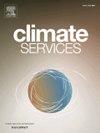Adaptation to climate variability and household welfare outcomes in Uganda
IF 4.5
3区 环境科学与生态学
Q2 ENVIRONMENTAL SCIENCES
引用次数: 0
Abstract
Over the last one decade, most of the empirical studies on climate variability have largely concentrated on assessing the effect of climate variability on agriculture. Little attention has been given to the analysis of what factors determine the decision to adapt to climate variability and what impact does it has on welfare of the adapting households. This paper therefore, assesses the determinants of adaptation to climate variability and how it influences welfare of the farming households in Uganda. To achieve this, the study utilizes six waves of Uganda National Panel survey collected by Uganda Bureau of Statistics spanning over a period of 10 years from 2009 to 2019 and the switching regression model for empirical analysis. The findings indicate that adapting to climate variability is beneficial to adaptors as it safeguards welfare deterioration. On the other hand, presence of climate variability, age of the household head, the value of household assets, location, formal land ownership, having main occupation as agriculture and availability of extension services were identified as key determinants of the decision to adapt to climate variability among farming households in Uganda. These findings thus highlight the importance to have measures to improve adaptation process at the same time enhancing household welfare.
乌干达适应气候多变性和家庭福利成果
在过去十年中,大多数关于气候变异性的实证研究主要集中于评估气候变异性对农业的影响。人们很少关注哪些因素决定了适应气候变异性的决定,以及适应气候变异性对适应家庭的福利有何影响。因此,本文评估了乌干达农户适应气候变异性的决定因素及其对农户福利的影响。为此,本研究利用乌干达统计局收集的从 2009 年到 2019 年 10 年间的六次乌干达全国面板调查以及转换回归模型进行实证分析。研究结果表明,适应气候多变性对适应者有利,因为它可以防止福利恶化。另一方面,气候多变性的存在、户主年龄、家庭资产价值、地理位置、正式土地所有权、主要职业为农业以及推广服务的可用性被认为是决定乌干达农户是否适应气候多变性的关键因素。因此,这些研究结果凸显了在提高家庭福利的同时采取措施改善适应过程的重要性。
本文章由计算机程序翻译,如有差异,请以英文原文为准。
求助全文
约1分钟内获得全文
求助全文
来源期刊

Climate Services
Multiple-
CiteScore
5.30
自引率
15.60%
发文量
62
期刊介绍:
The journal Climate Services publishes research with a focus on science-based and user-specific climate information underpinning climate services, ultimately to assist society to adapt to climate change. Climate Services brings science and practice closer together. The journal addresses both researchers in the field of climate service research, and stakeholders and practitioners interested in or already applying climate services. It serves as a means of communication, dialogue and exchange between researchers and stakeholders. Climate services pioneers novel research areas that directly refer to how climate information can be applied in methodologies and tools for adaptation to climate change. It publishes best practice examples, case studies as well as theories, methods and data analysis with a clear connection to climate services. The focus of the published work is often multi-disciplinary, case-specific, tailored to specific sectors and strongly application-oriented. To offer a suitable outlet for such studies, Climate Services journal introduced a new section in the research article type. The research article contains a classical scientific part as well as a section with easily understandable practical implications for policy makers and practitioners. The journal''s focus is on the use and usability of climate information for adaptation purposes underpinning climate services.
 求助内容:
求助内容: 应助结果提醒方式:
应助结果提醒方式:


